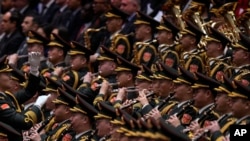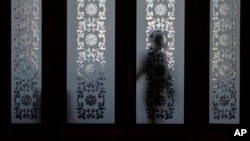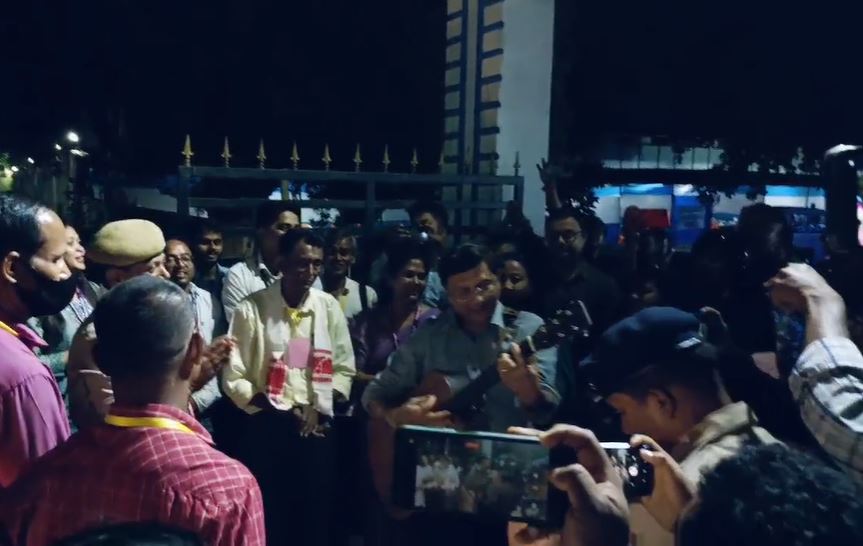The ongoing plenary sessions of the National People’s Congress (NPC) and the Chinese People’s Political Consultative Conference (CPPCC) provide an annual refresher course on how to practice democracy under the guidance of the Chinese Communist Party.
The conference of representatives elected through Beijing’s so-called democratic elections, known as the “two sessions,” opened in Beijing this week with nearly 3,000 National People’s Congress deputies gathered at the Great Hall of the People.
The National People’s Congress is the world’s largest legislative body and the nominal highest authority in China. However, its representatives are not elected directly, but by the provincial people’s congresses or electoral colleges of the 35 provinces or special administrative regions. The only direct elections are at the county and township levels.
Under the law, potential People’s Congress deputies can be nominated and recommended by voters and groups, but must be approved by the Communist Party of China.
On March 4, Lou Qinjian, spokesman for the second session of the 14th National People’s Congress, said at a press conference that the work of the National People’s Congress must follow the “six important principles” proposed by Xi Jinping, General Secretary of the Communist Party of China in 2021.
First, “we must uphold the leadership of the Communist Party of China” and “make the National People’s Congress a political organ that consciously adheres to the leadership of the Communist Party of China.”
Although the party strictly controls the selection of delegates, a handful of dissident independents have managed to gain passage at the local level. Some of them told VOA about their experiences.
Huang Songhai, a former independent representative to the Poyang County People’s Congress in Jiangxi Province in 2007, told VOA that efforts to reform the process have been mostly frustrated.
“Our election is a sham. Sure, we’re making a little progress. But basically, it’s still a sham,” Huang said.
Yao Lifa, the former deputy to the People’s Congress of Qianjiang City, Hubei Province, ran as an independent candidate and was elected as a county-level representative in 1998. He told VOA that public enthusiasm for participation has declined in recent years.
“We’ve had many elections, but what was the result? What was the impact? What was the impact on society, on our class, on me personally? I’m not very satisfied, not even satisfied,” he said.
Yao said the space for candidates to campaign independently, campaign and volunteer is shrinking.
Wang Xiuzhen, who served as a deputy to the local people’s congress in 2011 and 2021, told VOA that the authorities will cancel candidates who take office without being nominated by the party.
“After I ran away, I was completely overpowered,” she said. “They took me from our community, from my home, to the countryside, to the suburbs. It was like surveillance and house arrest on me. And then I wasn’t allowed to come back from there until after the election.”
Ms. Wang said that during these two meetings, she had been under surveillance, “as if I was a dangerous person and was always being watched. Now, they are watching me again. There are always people stationed in front of my house, and they follow me all the time.” It’s all me when I come out.”
Xi Jinping, who in 2022 became China’s most powerful leader since Mao Zedong, proposed in 2019 what he called “people’s democracy throughout the process.”
The process “integrates democratic elections, consultations, decision-making, management and supervision conducted in accordance with the law through a series of legal and institutional arrangements,” according to the state-run People’s Daily.
Ye Jinghuan, who is running for independent representation in Beijing in 2021, told VOA that China’s full-scale people’s democracy needs great improvements, including judicial independence, and that deputies to the National People’s Congress should have their own powers.
Now, “they exercise very little real power. The authorities set the tone and then everyone raises their hands.” [to vote on it] That’s it,” she said.
Despite the lack of democracy, Ye did not give up. She said elections are about participation and everyone must be willing to contribute to the progress that can be achieved.
Follow us on Google news ,Twitter , and Join Whatsapp Group of thelocalreport.in


















